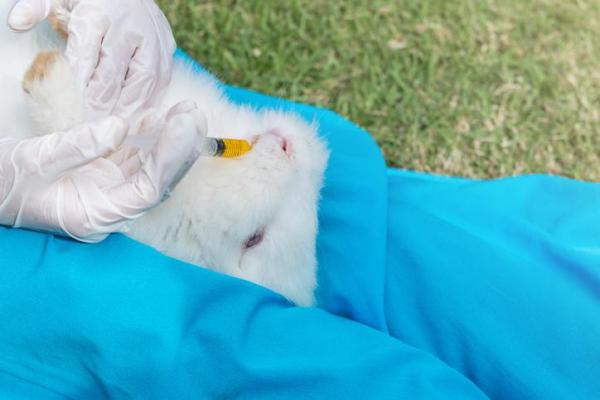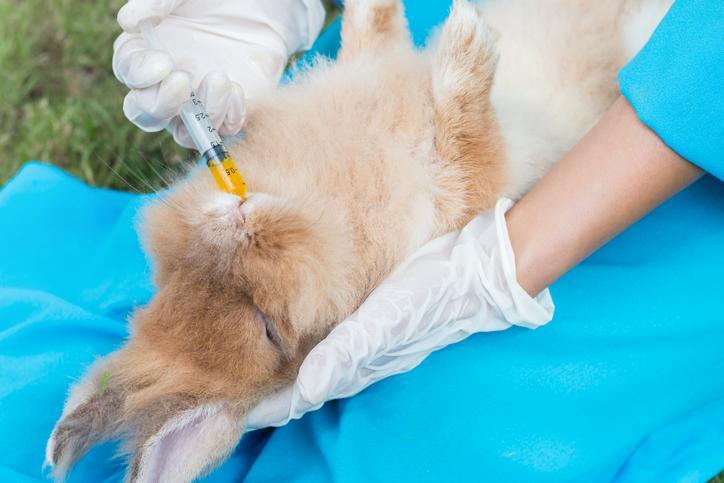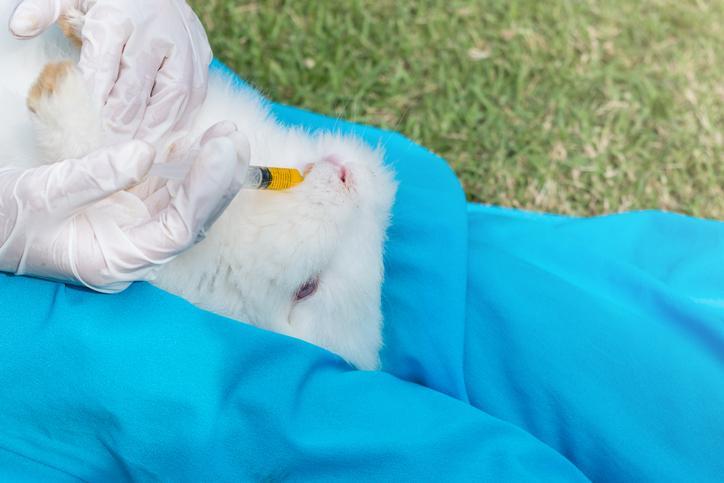Rabbit Dewormer Types and Dosage



See files for Rabbits
We might associate deworming products with cats and dogs, but we ignore potential parasites in rabbits at our bunny's peril. Especially when they are kept in outdoor hutches, rabbits are vulnerable to many different types of internal and external parasites. Said parasites can enter their body through food or interaction with the feces of other animals, as well as infesting their skin directly. Some of these parasites are zoonotic, meaning they can be transmitted to humans. For this reason, protecting your rabbit from parasites means you are also protecting the other members of the home.
At AnimalWised, we look at the best rabbit dewormer types and dosage. We discover the types of preventive rabbit wormers for both internal and external parasites.
Is it necessary to deworm rabbits?
Yes, it is necessary to deworm rabbits since they are vulnerable to both external and internal parasites. More than simply causing itching, these parasites can infest a rabbit to the point their organism shuts down. This is even more concerning for vulnerable rabbits which may be advanced in age or have other reasons for lowered immunity.
When we adopt a rabbit, we need to meet their specific needs. This includes providing them with sufficient exercise. Often this involves the use of a rabbit run which is placed directly on the lawn. On this lawn can be many small parasites, whether in the egg, larval or adult stages. Our rabbit can eat something infested with parasites or they can infest the animal directly.
Other forms of infestation can occur. This is especially the case with rabbits that live with other animals. Other species of animal such as dogs or cats can have infestations of certain parasitical organisms which can pass on to the bunny. This can be in the form of external parasites such as fleas and ticks, as well as internal parasites such as tapeworms, roundworms or coccidia.
For these reasons, preventive deworming measures are of great importance. Both internal and external deworming procedures are necessary and will need to be carried out periodically. In the following sections, we look at what rabbit deworming products are available. However, you will need to speak to your veterinarian to determine which deworming agent is best for your individual rabbit.
Parasites in rabbits can provide many symptoms. Learn about a common issue for rabbits with external parasites in our article on why a rabbit is losing their fur.

Internal rabbit deworming
As their name suggests, internal dewormers are used for internal parasites and are taken orally. This is most often in the form of antiparasitic tablets, but can also be found in syrups which are administered via oral syringe.
It is recommended that rabbits be dewormed a couple of times a year with a broad-spectrum product. Specific treatments for certain parasites may be carried out by a veterinarian once an infestation is detected. The type of product will vary according to many factors such as geographical location. Determining the type of internal rabbit dewormer, its presentation and dosage will need to be carried out under veterinary supervision.
Generally speaking, the first internal deworming in the rabbit should be carried out at around a month and a half. Where possible, it should be performed a week before their first vaccination. Syrups will require repeated administration and we need to ensure the rabbit ingests the entire dose correctly. Establishing a suitable deworming and vaccination schedule is one of the reasons veterinary consultation is important.
Below are some of the most common rabbit dewormers for internal parasites. We include information on what they are used for, as well as general information on dosage:
- Fenbendazole: often sold under the brand names Panacur and Safeguard, this is a broad-spectrum dewormer which is provided in a paste or granules. It is mainly used to treat gastrointestinal worms. The dose is usually 20 mg/kg of body weight administered for 3 consecutive days.
- Ivermectin: another anthelmintic, i.e. used to kill parasitic worms. It is available in oral solutions and injectable formulations, although the latter is usually only used in a clinical setting. The dosage will depend greatly on its use, but an example is 0.2 mg/kg administered subcutaneously when used for ear mites.
- Pyrantel pamoate: another internal dewormer for rabbits used to treat gastrointestinal parasites such as roundworms and hookworms. It is commonly available in oral suspension or tablet form. Dosage and duration will depend on the use and condition of the rabbit, but is commonly administered orally at a dose of 5-10 mg/kg of body weight.
- Selamectin: often sold under the brand name Revolution, this is a topical treatment which can also be used to treat internal parasites, although it is more common for external parasites in rabbits. Dosage is dependent on the concentration of the product and other factors.
When considering the right course of action for deworming rabbits, you should consider the following:
- Ask for help: if we are unsure what we are doing when administrating the dewormer, we should ask for help. Initially, you can have the veterinarian explain how to give the dewormer to the animal. When we do it ourselves, we can ask a friend or family member to keep the rabbit calm while we administer the dose.
- Use a towel: you can use this to wrap the rabbit and keep them restrained. Rabbits are known for kicking, so being careful of their back legs is particularly important. This does not mean we should use excessive force, but hold it firmly and gently.
- Prepare: ensure you have everything you need prepared and at hand. If not, it can be difficult to administer the dose when trying to access other material.
- Routine: some rabbits may benefit from having the medication always administered at the same time, so that it can be incorporated into their routine. Others may become more nervous if they recognize what awaits them, so it may be a good idea to change the administration time and take advantage of the surprise factor.
- Reassure them: after administering the medication, allow them to take refuge in a quiet place. We can also give them a treat and generally provide positive reinforcement.
To be able to administer rabbit dewormers a second time, we will have to wait until they are six months old. If we have to give him tablets, we may be able to dissolve them in water and administer these with an oral syringe. If this does not work, we may be able to give it to them with food. This will be difficult with rabbit pellets, but you may be best using fruit or vegetables for rabbits. This usually requires breaking the tablet down.
Learn more about the most common diseases in rabbits which might be prevented with dewormers.

External rabbit deworming
External deworming agents are used to protect the rabbit's coat and skin from potential pests such as fleas in rabbits. This usually involves the process of adsorption, whereby the product adheres to the skin and hair for an extended period of time. Once the product has worn off, a new dosage will need to be administered. Some external dewormers may be given via injection, but pipette and spray preparations are most common.
The most common external dewormers for rabbits and their dosages include:
- Ivermectin: although also used as an internal dewormer, ivermectin is versatile and can be used to treat parasites such as ear and fur mites. It is not as commonly used as a preventive and will need veterinary prescription for use. Dosage is usually 0.2 mg/kg administered subcutaneously.
- Selamectin: commonly sold under the brand name Rvolution. It is a topical broad-spectrum antiparasitic agent which is used to treat mites, fleas and ticks. Dosage can be 6-18 mg/kg, but this will depend on the size of the rabbit and other factors. Learn more with our article on selamectin for rabbits.
- Fipronil: often sold in Pipette form by brands such as Frontline for rabbits. It is usually in the form of one dose of pipette for a certain period of protection, but this will depend on the specific product used.
- Pyrethrin-based products: shampoos and sprays which are used to kill an infestation. They are not good as a preventive measure.
The above types of rabbit dewormers have different uses for different problems. Some are used preventively, but others are best used when an infestation has already occurred. The exact product your rabbit needs will depend on many factors which we cannot determine here. You will need to speak to a veterinarian who will guide you. The veterinarian will determine the best vaccination and deworming schedules for your rabbits.
While rabbit vaccinations will need to be carried out clinically by the vet, we should be able to administer deworming treatments at home once the veterinarian has confirmed the correct product and dosage.

This article is purely informative. AnimalWised does not have the authority to prescribe any veterinary treatment or create a diagnosis. We invite you to take your pet to the veterinarian if they are suffering from any condition or pain.
If you want to read similar articles to Rabbit Dewormer Types and Dosage, we recommend you visit our De-worming category.







